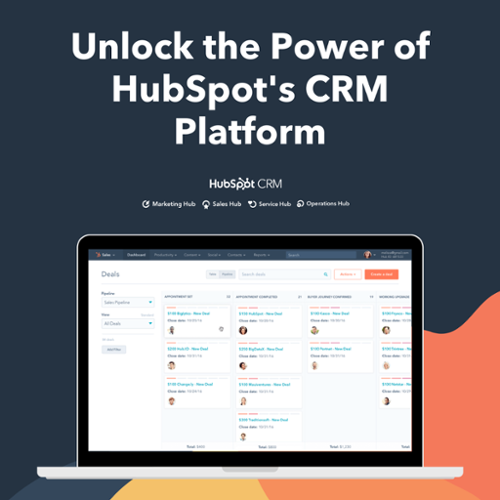Ready to step up your customer relationships?
In today's business world, having a solid customer relationship management (CRM) strategy is vital. But with so many options available, how do you pick the right one?
Let's meet our contenders: HubSpot and Constant Contact. HubSpot is a powerful platform that revolutionizes your marketing and sales efforts, while Constant Contact is a trusted name in email marketing and customer management.
In this comparison, we'll look at their features, pricing, and support systems, giving you the insights you need to choose the best fit for your business. Let's dive in and find the perfect CRM software for you.
HubSpot vs. Constant Contact: Unveiling the Differences
In this section, we'll unravel the Constant Contact vs HubSpot dispute as we compare their features, pricing, and support. By the end, you'll have the knowledge to select the ideal tool to take your business to new heights. So, let's go!
HubSpot vs. Constant Contact: Integrations
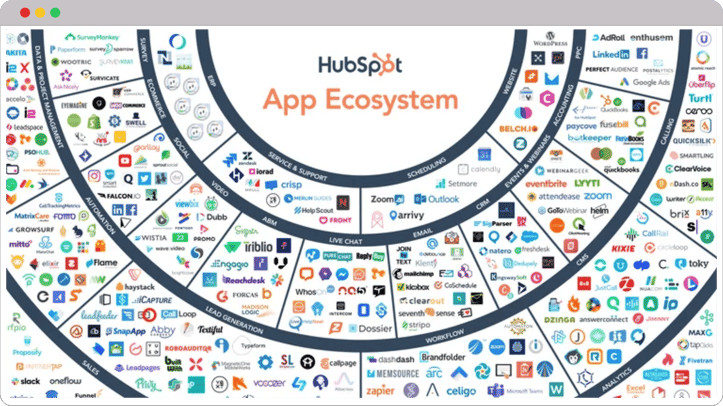

Verdict:
When it comes to integrations, HubSpot offers a wider range of options. They work with popular CRM and sales platforms, as well as different marketing and e-commerce systems. This gives you more flexibility in connecting HubSpot with the tools you need.
HubSpot vs. Constant Contact: Email Builder
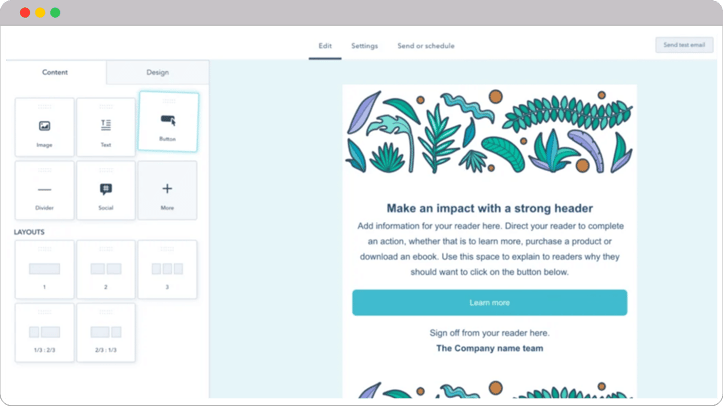
While Constant Contact's email builder is a standalone solution focusing solely on email marketing. It features a user-friendly drag-and-drop interface that simplifies the modification of email templates. Constant Contact also includes automation and segmentation features, along with social media integration for wider reach.
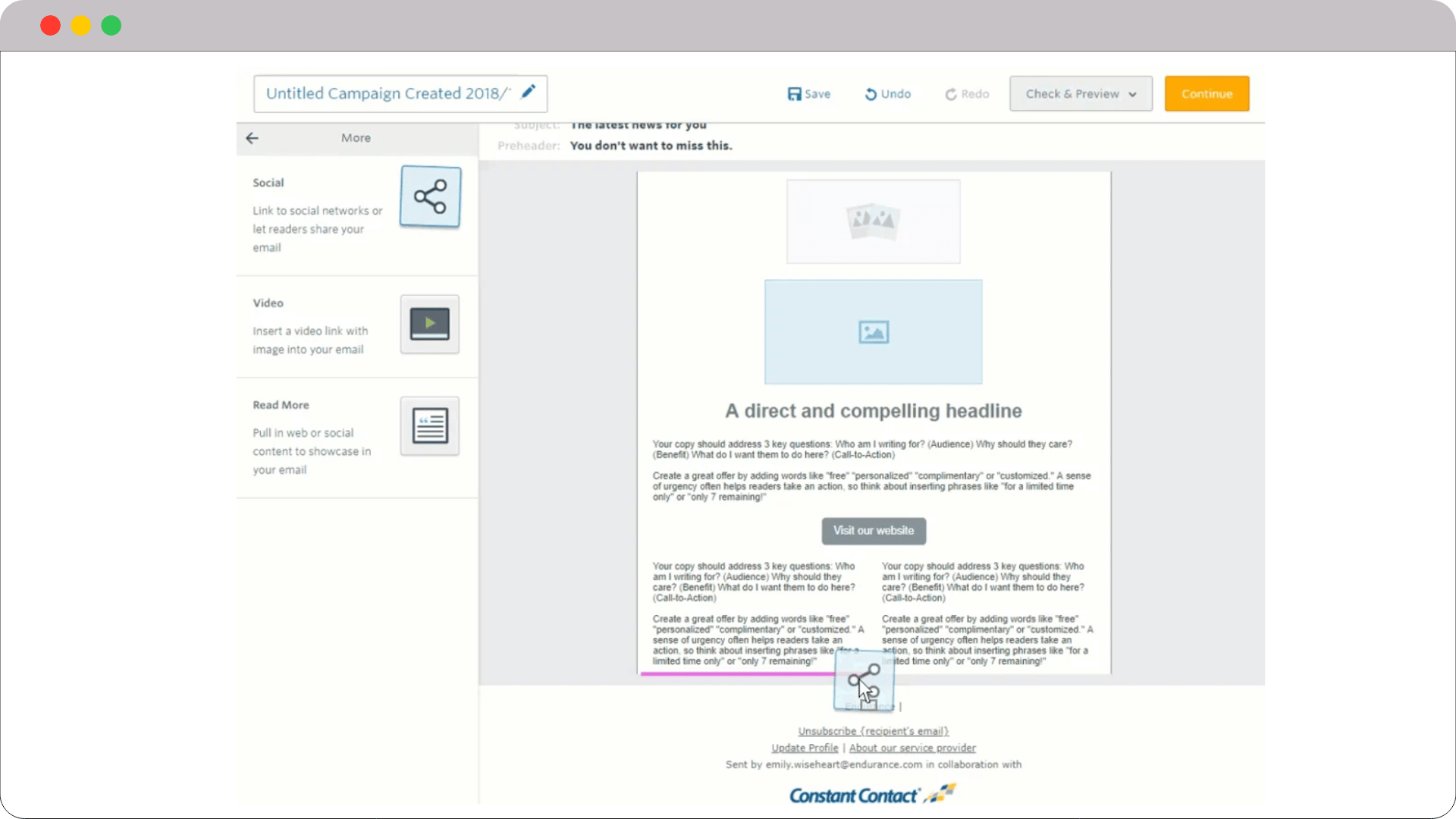
Verdict:
HubSpot's email marketing tool is considered more advanced and flexible. It offers a more expansive range of features and integrates well with other marketing tools. HubSpot's email builder is the better option if you want a powerful and versatile email marketing platform that works seamlessly with your other marketing efforts.
HubSpot vs Constant Contact: Landing Pages

On the contrary, Constant Contact allows you to create landing pages and collect information from new contacts using pop-ups, inline forms, and landing page sign-up forms. You can also leverage OptinMonster to create sign-up forms and pop-ups for your landing pages.
Constant Contact offers some customization options, such as customizing the fields and the text, style, and color of the landing pages. However, the design options are limited, allowing changes only to the background color and font style.

Verdict:
HubSpot's landing page builder offers more advanced capabilities, including A/B testing, progressive profiling, and deeper personalization. It also provides a wider range of design options and unlimited landing page creation in its starter package.
HubSpot vs. Constant Contact: Campaign Management
With HubSpot, organizations can create and manage their marketing campaigns across multiple platforms, including email, social media, and their website. Additionally, HubSpot provides powerful CRM and sales automation tools, making it an all-in-one solution for both marketing and sales.
However, it's important to note that campaign management is not included in the free edition of HubSpot.

On the other hand, Constant Contact's campaign management capabilities allow organizations to create and distribute email campaigns to their subscribers, manage email lists, and track campaign performance. Constant Contact also integrates with various e-commerce platforms, making it a suitable choice for businesses that sell products online.

Verdict:
HubSpot provides a more comprehensive suite of marketing tools and campaign management features that cover a wider range of channels and functionalities.
HubSpot vs Constant Contact: Reporting
HubSpot offers a broader range of reporting options, providing detailed metrics for email marketing, social media campaigns, and website visitors. Users can track social media engagement, monitor website traffic sources, and access analytics such as email open rates, click-through rates, conversion rates, and revenue attribution.
HubSpot's reporting capabilities also include more advanced functionality, such as generating custom reports and dashboards and measuring the effectiveness of specific marketing channels or campaigns. This allows for in-depth analysis and optimization of marketing efforts.
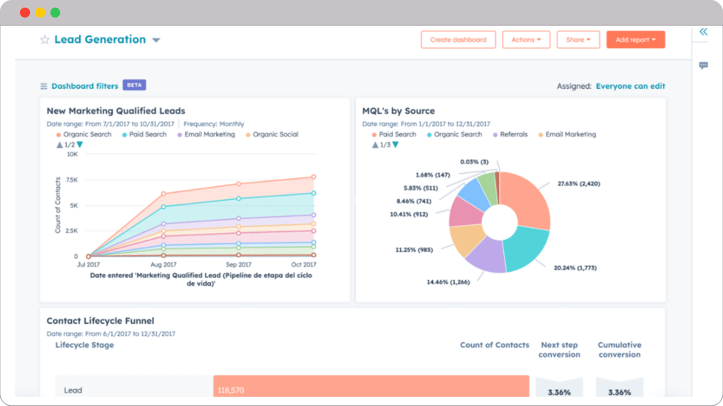
On the other hand, Constant Contact CRM provides basic reporting features. Users can track email open rates, click-through rates, and bounce rates to get an understanding of email campaign performance.
It also offers simple metrics for social media campaigns, such as likes, comments, and shares. While Constant Contact provides some insights into campaign performance, the reporting options are more limited compared to HubSpot.
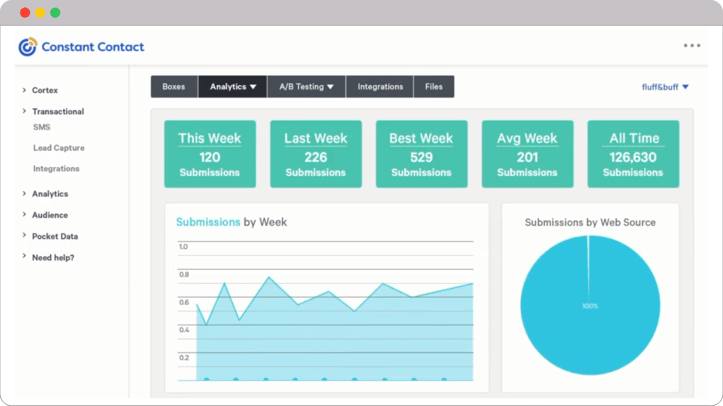
Verdict:
HubSpot offers a more comprehensive and robust reporting system, providing users with a broad range of metrics and analytics across various marketing channels. It enables deeper analysis and allows for more customized reporting to measure the success of specific campaigns or channels.
HubSpot vs. Constant Contact: Customer Support
HubSpot provides comprehensive customer support through various channels, including phone, email, live chat, and a knowledge base. They also have an active community where users can put up questions, share knowledge, and network with others. HubSpot's customer support team is known for being prompt, knowledgeable, and helpful, ensuring users receive the assistance they need.

Constant Contact also offers email and chat support and they, too, have a knowledge base and a community forum, although these resources may not be as extensive as HubSpot's. While Constant Contact's customer support team is generally helpful, some users have reported long wait times on the phone and delays in resolving issues.

Verdict:
HubSpot provides a more comprehensive and diverse range of customer support options, including live chat and a well-regarded community forum. Besides, they have a reputation for prompt and knowledgeable support.
HubSpot vs. Constant Contact: Pricing
HubSpot offers a free CRM solution that allows users to create landing pages, manage contacts, and launch email campaigns at no cost.
However, the free plan does not include social media management. To access social media management and other advanced marketing tools like blogging, SEO, and marketing automation, users need to sign up for the Professional Package, which starts at $800 per month. This package provides a comprehensive set of features to enhance your marketing efforts.
For detailed pricing, check out: HubSpot Marketing Hub Pricing: A Breakdown for Businesses
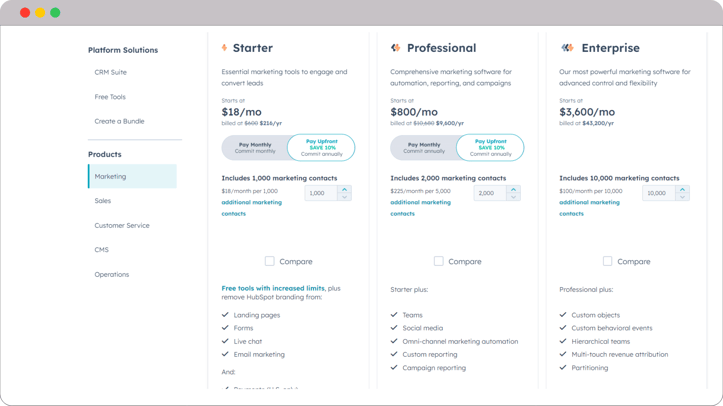
On the other hand, Constant Contact primarily offers two options: the Email Plan and the Email Plus Plan.
The Email Plan is priced at $9.99 per month and includes features such as unlimited emails, 300+ email templates, customer list growth tools, real-time reporting, social posting, and subject line A/B testing. It also provides live phone and chat support, shoppable landing pages, ecommerce marketing, and surveys.
The Email Plus Plan, priced at $45 per month, offers additional features, including email marketing automation, dynamic content, customizable pop-up forms, surveys, event registration, personalized launch call, and ecommerce segmentation. 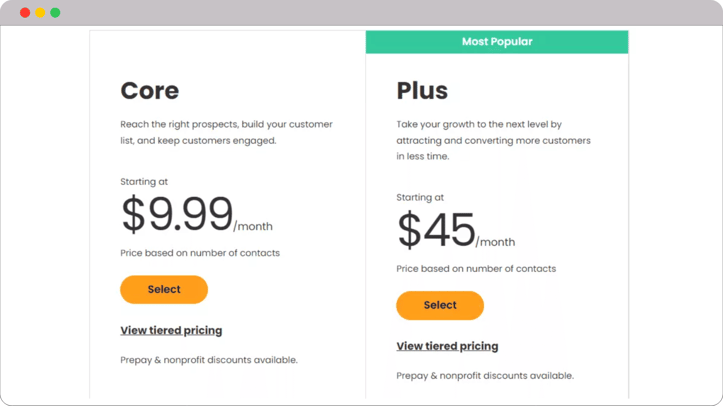
Verdict:
HubSpot's pricing is a bit expensive compared to Constant Contact. So, for small businesses with a limited budget, Constant Contact would be a better choice.
HubSpot vs Constant Contact - Which CRM Comes out on Top?
In conclusion, both Constant Contact and HubSpot offer valuable features for marketing and customer relationship management.
HubSpot stands out with its all-in-one marketing platform, encompassing various functionalities such as email marketing, social media management, landing page creation, and campaign management. It provides advanced features, integrations with popular CRM systems, and extensive reporting options. However, its pricing structure can be a bit expensive, requiring consideration of the Professional Package for advanced features.
On the other hand, Constant Contact focuses primarily on email marketing while offering additional features like event marketing and social media marketing. Its pricing structure is straightforward, with two plans to choose from, making it easier for users to understand. However, the features and capabilities may be more limited compared to HubSpot.
Here's an overall rating breakdown of these two marketing software.
Features |
HubSpot |
Constant Contact |
|
Meets Requirements |
8.5/10 |
8.4/10 |
|
Ease of Use |
8.6/10 |
8.4/10 |
|
Ease of Setup |
8.1/10 |
8.4/10 |
|
Ease of Admin |
8.6/10 |
8.5/10 |
|
Quality of Support |
8.8/10 |
8.2/10 |
(Source: G2)
Take your time to think about your options, compare the advantages and disadvantages, and then make an informed decision. With the right marketing tool, you'll be able to drive your business forward and achieve your marketing goals.
|
HubSpot |
Constant Contact |
|
HubSpot is an all-in-one marketing, sales, and service platform that offers a wide range of tools to help businesses grow, including email marketing, social media management, SEO, analytics, and more. |
Constant Contact is a platform that is focused primarily on email marketing, offering templates, automated campaigns, segmentation, and more. |
|
HubSpot is the best email marketing tool with plenty of stunning features. It is suitable for mid to large business organizations. |
Constant Contact is not ideal for all sorts of businesses. It is better suited to small enterprises and non-profit organizations. |
|
HubSpot's ease of use, two-way data sync, and developer-friendly API may make it a superior alternative for firms that value simplicity and customisation. |
Constant Contact has simplistic user interface and has integrations features but not robust as HubSpot. if a business is primarily focused on email marketing and wants a more affordable option based on the number of contacts, Constant Contact may be the better choice. |
Making the final Decision on the ideal CRM Solution?
Now that you know all the details about each tool, it's time to make a choice that's right for your business.
Think about the features, pricing, and support that each platform offers. Consider what you want to achieve with your marketing efforts, whether it's managing everything in one place or focusing on email marketing. Make sure the tool can grow with your business as it expands.
Remember, no tool is perfect. Each platform has its strengths and weaknesses, and what works for one business might not work for another. The important thing is to find the tool that fits your requirements and helps you reach your target audience effectively.
So, go ahead and choose the tool that suits your business best. You've got this!
And if you're ready to dive into the world of HubSpot and want some help along the way, don't hesitate to reach out!
Related blogs:
HubSpot Alternatives: Which CRM reigns supreme in 2023?
Why switch to HubSpot? Have a look at these in-depth HubSpot reviews
HubSpot vs Pardot: Make the Right Choice for Your Marketing Team
HubSpot vs Eloqua: Comparing Cost, Features, and Ease of Use
Frequently Asked Questions
How is HubSpot different from its competitors?
HubSpot stands out from competitors as it offers more than just marketing automation. It's a versatile productivity tool, serving as a complete growth stack. Unlike others, it allows you to seamlessly manage digital marketing, integrate with sales activities, and host your website. In essence, HubSpot provides an all-in-one solution for businesses seeking to streamline their online presence and growth strategies.
Does HubSpot have a pricing tool?
Yes, HubSpot provides a pricing tool in the form of free pricing calculator templates. These templates enable you to create and compare up to nine unique pricing strategies, helping you understand how they might affect your revenue and profit. Simply input your data, and the tool will help you determine the most suitable pricing approach for your specific needs, making it easier to make informed decisions about your business pricing strategies.
Does Constant Contact connect with HubSpot?
Yes, Constant Contact can connect with HubSpot. This integration works in a two-way sync, meaning that data is shared between the two platforms in real time. It also provides default field mappings for a quick and easy setup, with predefined mappings available. Additionally, historical syncing ensures that your existing data is synced immediately, and any updates are synchronized as they occur. This streamlined connection between Constant Contact and HubSpot helps businesses manage their email marketing and CRM data seamlessly.
Do people still use Constant Contact?
Yes, people still use Constant Contact. It's an email marketing and customer relationship management (CRM) platform that's been around since 1995. It's particularly popular among small businesses. Constant Contact aids in expanding customer reach, managing email campaigns, creating landing pages, and promoting events. It still remains a good tool for many businesses wanting to connect with their customers via email marketing.
